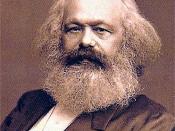Throughout time, there have always been people who have been considered to be great thinkers. Karl Marx (1818-1883) was a German revolutionist whose thoughts on capitalism, politics, and society allow him to be known as one of the most influential thinkers of all time. Although Marx's influence on society during his life was not widespread, after his death his ideas and beliefs spread throughout the world as Marxism, becoming the basis of modern socialist doctrine.
Marx met Friedrich Engels (1820-1895) in 1844 and the two discovered that they had identical views on the nature of revolutionary problems. They worked together to develop theoretical principles of communism and to organize a working class movement to see those principles come to light.
Along side his works concerning communism, Marx was also a pioneer in the field of sociology. He is known as the father of the conflict perspective of sociology. Conflict theorists tend to concentrate on social conflict, to see that social change as beneficial, and to assume that the social order of a society is forcibly imposed by the powerful onto the weak.
Marx believed that social conflict was simply conflict between any unequal group or society, and in that, there was always a winner (the powerful bourgeoisie) and the looser (the proletariat). He also believed that the more powerful group gains more than the less powerful, and while the former continue to seek even more wealth and power, the latter are lost in a continuous battle for basic rights and resources. And because this competition is perpetual, society is always changing.
According to Marx, the basic change was found in that all human history represents a struggle to improve human condition; however, no matter long and hard the strugglers fight, there seems to always be various social institutions who wish...


